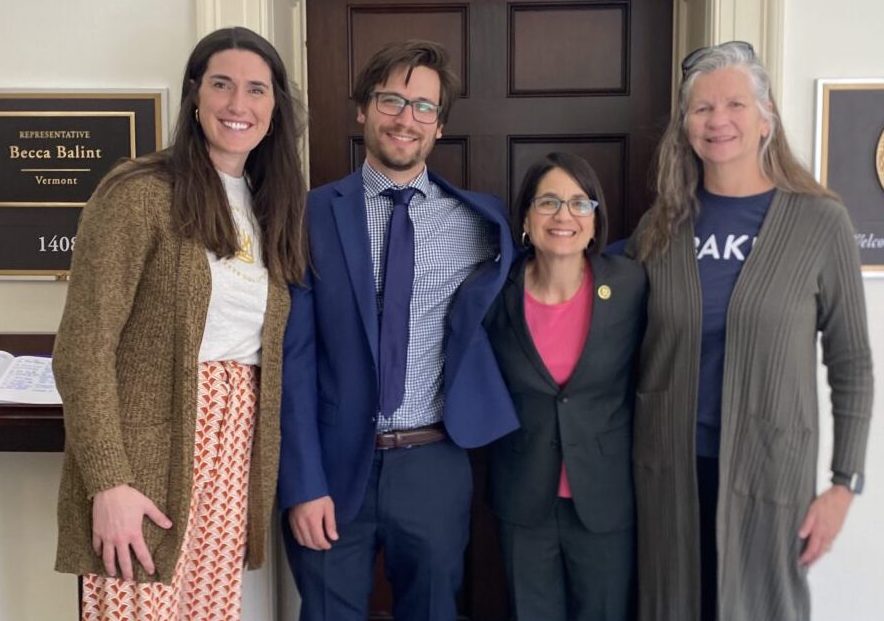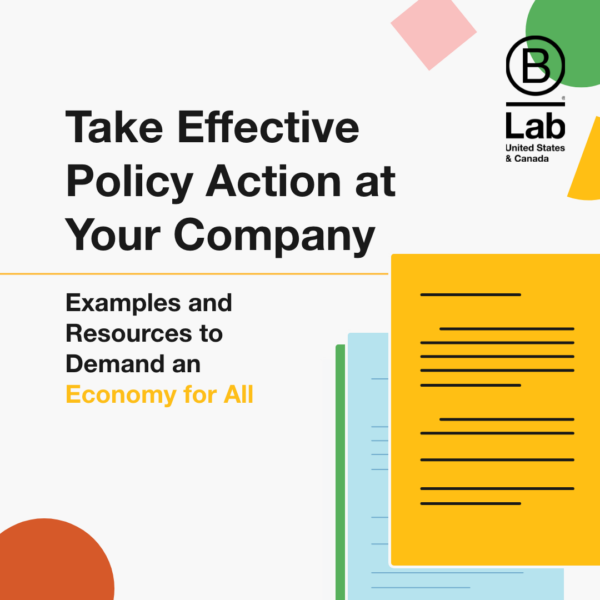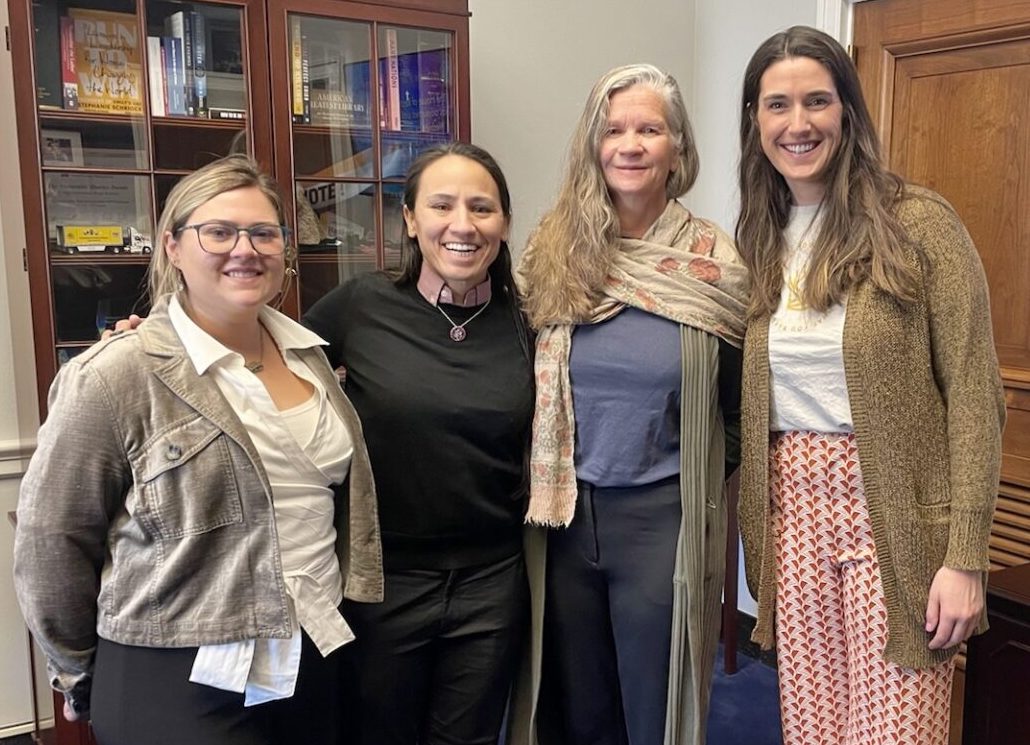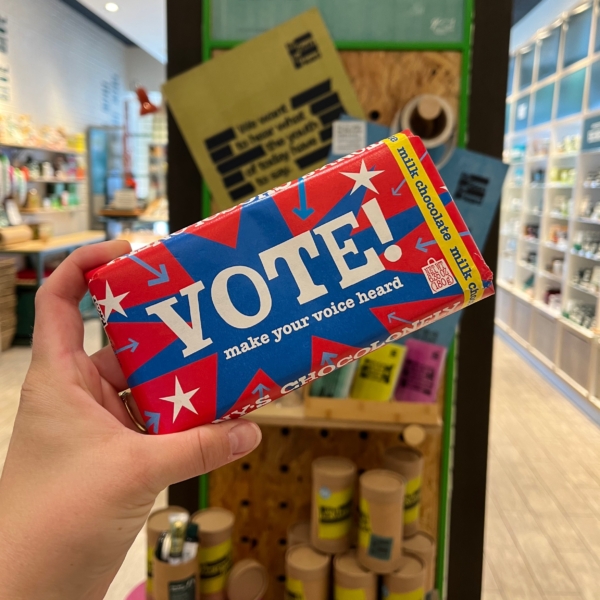King Arthur Baking Company Shares Its Framework for Policy Advocacy
August 21, 2024
B Corp’s Advocacy History Is Rooted in Transition to Employee Ownership
Drawing from its long-standing commitment to advocacy, King Arthur Baking Company offers a useful blueprint for other Certified B Corporations to drive systemic change through policy initiatives.
King Arthur draws from a deep history as America’s oldest flour company and a founding B Corp. The company was founded as a family-owned business in 1790, switched to an employee stock ownership plan in 1996, and has been 100% employee-owned since 2004. Since that transition, the company has grown significantly, incorporating a bakery and a baking school, and extending distribution of its flours and mixes to retailers across the United States.
King Arthur Corporate Social Responsibility Manager Molly Lawrence said the company’s long history of advocacy is rooted in its transition to employee ownership. The Vermont-based B Corp spent years advocating for frameworks that strengthened employee ownership before broadening its focus in recent years. The company crafted a broad Statement of Advocacy & Activism following the events catalyzed by George Floyd’s murder in 2020. By the following year, King Arthur honed the internal statement to focus on food justice and environmental sustainability — two areas directly connected to the B Corp’s operations and mission.

King Arthur Baking Company Corporate Social Responsibility Manager Molly Lawrence, left, and Suzanne McDowell, far right, VP of Corporate Social Responsibility & Sustainability, meet with U.S. Rep. Becca Balint of Vermont, second from right, during a March 2023 visit to Capitol Hill. King Arthur team members joined the American Sustainable Business Network as part of the Farmer Climate Resilience Rally, where they urged policymakers to prioritize climate policy in the 2024 Farm Bill.
“This shift was supported by an emissions study we conducted in March 2021 to deepen our understanding of our environmental impact and better target necessary policy changes,” Lawrence said. “Our advocacy now concentrates on promoting a food system that is more regenerative, nourishing, and equitable — reflecting our commitment to making planet-forward, people-positive decisions that benefit everyone, today and into the future.”
That’s reflected in the statement, which provides guidance and support for company advocacy: “As believers in the universality of baking, we are for everyone having an equitable seat at the table and we are against barriers that stand in the way of equality.”

Examples and Resources to Demand an Economy for All
This free resource shares how B Lab U.S. & Canada and the B Corp community are building a stakeholder economy and driving collective political action to make the rules of the game more equitable and beneficial for all.
Building a Policy Framework
Lawrence said King Arthur prioritizes advocacy areas with a unique perspective or where its business operations directly impact outcomes, focusing its efforts within the United States.
To shape its advocacy initiatives, the company has utilized both internal assessments and external partnerships with entities such as the American Sustainable Business Network, National Young Farmers Coalition, Regenerate America, and Hunger Free Vermont. Lawrence said these collaborations enhance the company’s ability to navigate the policy landscape effectively and focus its efforts on improving the food system.
“Our advocacy is aligned with our mission, leveraging our influence as a leading business to drive meaningful impact,” Lawrence said.
Its recent advocacy work has focused on safeguarding soil health and calling for policies prioritizing soil health as a tool to mitigate climate change. According to the United Nations Food and Agriculture Organization, 90% of Earth’s topsoil could be jeopardized due to accelerated soil erosion and land degradation from industrial farming practices by 2050.
As part of the 2024 Farm Bill, King Arthur and its partners helped introduce five bills to Congress, including the Soil CARE Act; the Food Supply Chain Capacity and Resiliency Act; the Increasing Land Access, Security, and Opportunities Act; the Fair Credit for Farmers Act; and the Peer Learning for Agriculture Conservation Education Act. In March 2023, the company sponsored a fly-in to Washington, D.C., so a group of young farmers from across the country could come together to discuss equitable climate action and land access in the 2024 Farm Bill with members of Congress.

The King Arthur Baking advocacy trip to Capitol Hill included a meeting with U.S. Rep. Sharice Davids of Kansas, second from left. At right are Suzanne McDowell, VP of Corporate Social Responsibility & Sustainability, and Corporate Social Responsibility Manager Molly Lawrence.
For high-profile political and social issues, the company has established a structured approach that determines its level of engagement based on the potential impact and alignment with its values of food justice. Lawrence said that by evaluating each situation through this lens, the company ensures that its actions reflect its commitment to advocacy and harness collective influence to advocate for systemic changes in food systems and beyond.
“This framework guides our responses, ensuring they are strategic and consistent with our capabilities to influence meaningful change,” Lawrence said.

A Guide to Government Affairs & Collective Action in Practice
This guide from B Lab U.S. & Canada provides examples and resources to support collective advocacy efforts in the B Corp community.
Providing a Blueprint
When it comes to advice King Arthur would share with other businesses interested in starting or expanding their advocacy work, Lawrence recommended that companies focus on areas where their business can provide unique insights or impacts. She also urged businesses to work to establish robust partnerships, maintain a consistent advocacy message, and ensure that their business practices reflect the values they promote.
“Remember, advocacy is more than lobbying; it includes strategic grantmaking, partnerships with advocacy organizations, consumer education, and aligning internal business practices with public stances,” Lawrence said.
As a B Corp, Lawrence said King Arthur sees itself as part of a global movement committed to balancing profit and purpose and striving to use business as a force for good. She said the company’s efforts to promote food justice reflect its dedication to social and environmental performance. They also align with the company’s support for collective effort, which includes its role as a founding member of the Vermont B Corp Collective launched in 2023.
“By collaborating with other B Corps, we amplify our impact, working together to shift paradigms and foster an inclusive, equitable, and regenerative economy,” Lawrence said.
Sign Up for our B The Change Newsletter
Read stories on the B Corp Movement and people using business as a force for good. The B The Change Newsletter is sent weekly.




